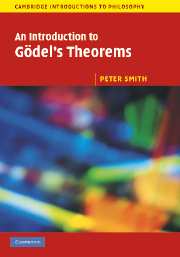Book contents
- Frontmatter
- Contents
- Preface
- 1 What Gödel's Theorems say
- 2 Decidability and enumerability
- 3 Axiomatized formal theories
- 4 Capturing numerical properties
- 5 The truths of arithmetic
- 6 Sufficiently strong arithmetics
- 7 Interlude: Taking stock
- 8 Two formalized arithmetics
- 9 What Q can prove
- 10 First-order Peano Arithmetic
- 11 Primitive recursive functions
- 12 Capturing p.r. functions
- 13 Q is p.r. adequate
- 14 Interlude: A very little about Principia
- 15 The arithmetization of syntax
- 16 PA is incomplete
- 17 Gödel's First Theorem
- 18 Interlude: About the First Theorem
- 19 Strengthening the First Theorem
- 20 The Diagonalization Lemma
- 21 Using the Diagonalization Lemma
- 22 Second-order arithmetics
- 23 Interlude: Incompleteness and Isaacson's conjecture
- 24 Gödel's Second Theorem for PA
- 25 The derivability conditions
- 26 Deriving the derivability conditions
- 27 Reflections
- 28 Interlude: About the Second Theorem
- 29 µ-Recursive functions
- 30 Undecidability and incompleteness
- 31 Turing machines
- 32 Turing machines and recursiveness
- 33 Halting problems
- 34 The Church–Turing Thesis
- 35 Proving the Thesis?
- 36 Looking back
- Further reading
- Bibliography
- Index
24 - Gödel's Second Theorem for PA
Published online by Cambridge University Press: 05 June 2012
- Frontmatter
- Contents
- Preface
- 1 What Gödel's Theorems say
- 2 Decidability and enumerability
- 3 Axiomatized formal theories
- 4 Capturing numerical properties
- 5 The truths of arithmetic
- 6 Sufficiently strong arithmetics
- 7 Interlude: Taking stock
- 8 Two formalized arithmetics
- 9 What Q can prove
- 10 First-order Peano Arithmetic
- 11 Primitive recursive functions
- 12 Capturing p.r. functions
- 13 Q is p.r. adequate
- 14 Interlude: A very little about Principia
- 15 The arithmetization of syntax
- 16 PA is incomplete
- 17 Gödel's First Theorem
- 18 Interlude: About the First Theorem
- 19 Strengthening the First Theorem
- 20 The Diagonalization Lemma
- 21 Using the Diagonalization Lemma
- 22 Second-order arithmetics
- 23 Interlude: Incompleteness and Isaacson's conjecture
- 24 Gödel's Second Theorem for PA
- 25 The derivability conditions
- 26 Deriving the derivability conditions
- 27 Reflections
- 28 Interlude: About the Second Theorem
- 29 µ-Recursive functions
- 30 Undecidability and incompleteness
- 31 Turing machines
- 32 Turing machines and recursiveness
- 33 Halting problems
- 34 The Church–Turing Thesis
- 35 Proving the Thesis?
- 36 Looking back
- Further reading
- Bibliography
- Index
Summary
We now, at long last, turn to considering the Second Incompleteness Theorem for PA.
We worked up to the First Theorem very slowly, spending a number of chapters proving various preliminary technical results before eventually taking the wraps off the main proofs in Chapters 16 and 17. But things seem to go rather more smoothly and accessibly if we approach the Second Theorem the other way about, working backwards from the target Theorem to proofs of the technical results needed to demonstrate it. So in this chapter, we simply assume a background technical result about PA which we will call the ‘Formalized First Theorem’: we then show that it immediately yields the Second Theorem for PA when combined with Theorem 20.2.
In the next chapter, we show that the Formalized First Theorem and hence the Second Theorem can similarly be derived in any arithmetic theory T for which certain ‘derivability conditions’ hold (or rather, hold in addition to the Diagonalization Lemma). Then in Chapter 26 we finally dig down to discover what it takes for those derivability conditions to obtain.
Defining Con
We begin with four reminders, and then motivate a pair of new definitions:
Recall, Prf(m, n) holds when m is the super g.n. of a PA-proof of the wff with g.n. n. And we defined Prov(n) to be true just when n is the g.n. of a PA theorem, i.e. just when ∃m Prf (m, n). Thus, Prov(⌜ϕ⌝) iff PA ⊢ ϕ.
[…]
Information
- Type
- Chapter
- Information
- An Introduction to Gödel's Theorems , pp. 212 - 221Publisher: Cambridge University PressPrint publication year: 2007
